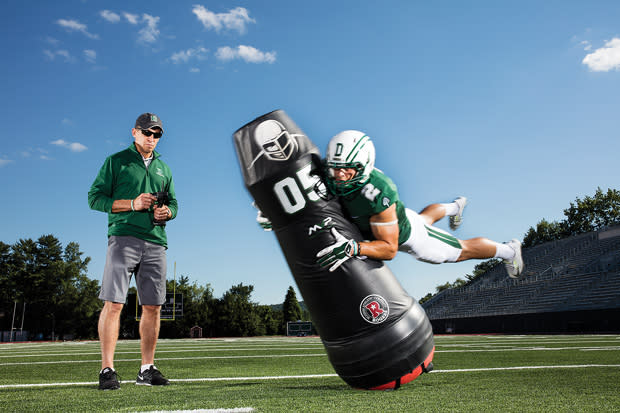Are robots a solution to reducing football concussions?
On the fringe of his team’s roster thanks to a crowded linebacking corps, even practice reps are hard to come by for Los Angeles Rams linebacker Folarin Orimolade. A single misstep for the undrafted rookie could spell the end of his NFL aspirations. The strange thing is that these vital reps sometimes come against non-human opponents in the form of a moving tackling dummy called the Mobile Virtual Player (MVP) – engineered at Dartmouth College, Orimolade’s alma matter.
“We use it [MVP] a lot on special teams here as well, trying to simulate a ball carrier or an extra blocker,” Orimolade said after the Rams’ joint practice with the Los Angeles Chargers earlier this month. “We have been doing no tackling like at Dartmouth so that part has been a very smooth transition.”
For a sport that that is constantly toeing the line between practicing how you play while at the same time trying to avoid injury, products like the MVP offer a solution.

The NFL has made a considerable effort in terms of rule changes to reduce concussions, including preventing “defenseless” players from taking hits above their shoulders and moving kickoffs to the 35-yard line to deemphasize kick returns. Still, rule changes can help reduce head injuries to only a certain degree in an inherently violent sport. That’s why advancements in equipment and training technology are being touted as football’s best bet for long-term survival.
The MVP, as one of these progressive initiatives, is the first robotic training dummy that can stand back up on its own. It’s controlled by a remote, weighs 190 pounds and can cover 40 yards in less than five seconds – similar to an elite NFL athlete.
The impetus for creating the MVP was the desire of Dartmouth head football coach Buddy Teevens to simulate real-game situations after completely eliminating player-on-player tackling from his practices in 2011. The 61-year-old Teevens – who has also made coaching stops at DePauw, Boston University, Maine, Tulane, Florida and Stanford – approached Dartmouth’s Thayer School of Engineering with the challenge of developing a moving tackling device.
Quinn Connell, now the vice president of engineering for MVP and currently spearheading the company’s goal to expand to youth football leagues, was involved with the development of the robotic dummy since his undergraduate days at Dartmouth.
“It was capstone design course,” Connell said “Buddy had cut tackling out of his practice for a year or two at that point, but that left him with sort of a lapse where they were limited in their ability to create real-live game environments. He brought that challenge to the engineering school.”
After several failed prototypes, Connell and his fellow team members were able to deliver a usable dummy to Teevens’ coaching staff in 2015. Dartmouth football quickly integrated the new invention and saw substantial drops in overall concussions for their team.

“There was a 52-percent reduction in concussions when comparing the two years before and after using MVP,” Connell said. “That’s in conjunction with Buddy’s no-tackling philosophy.”
Teevens also noticed that his front-line players were less physically banged up and missed less practice as a result of using the MVP in practice, leading to a more consistent brand of football for the program.
“We have seen a tangible lessening of orthopedic and soft tissue injuries,” Teevens said. “We used to have more of the soft tissue injuries when we were banging guys regularly in practice.”
Aside from a substantial reduction in head injuries, Teevens was surprised to see that come game day his team was better prepared to tackle even though they had exclusively hit the MVP dummies throughout the week. Since implementing the dummies into practice, the team captured its first Ivy League championship in 19 years during the 2015 season.
“We tackle a lot; we just don’t tackle each other,” Teevens said. “One of the nuances is that there are no clues. A receiver decelerates, arm actions change, stride length changes, steps alter a little bit, but with the MVP it just stops or takes a left or takes a right. It really forces you to rely on your fundamentals and reactions.”
With the success at Dartmouth, MVP, which costs $8,295 each, has gone from a culminating project in an engineering class to a full-fledged business, and now is being used in practice by 17 NFL teams and more than 20 FBS programs, including Texas, Auburn and Georgia.
“All the feedback we have gotten thus far has been really positive,” Connell said. “It’s really cool to work with forward-thinking coaches and people who are on the cutting edge of the game. The younger position coaches, who are responsible for the day to day, are very technologically savvy and it’s cool to see the different ways they choose to use the MVP because we are still looking at ways to expand its application beyond simply tackling.”
A big challenge remains in convincing coaches of the benefits of a product like the MVP.
“There are some coaches who are more traditional and want to use the Oklahoma drill and want their kids to be beating up on each other, ” Connell said. “We aren’t trying to take those coaches head-on, but I think the community at large is doing that. If they don’t switch their mentality they are going to be out of a job pretty soon.”
There is still a long way to go until the MVP is fully integrated into practices across the NFL, as even the early adopters of the product are reticent to completely neglect player-on-player tackling during the regular season. But with fear of concussions on the rise, look to technological initiatives such as robotic tackling dummies to help spearhead the preservation of America’s most popular sport.


 Yahoo Sports
Yahoo Sports 

